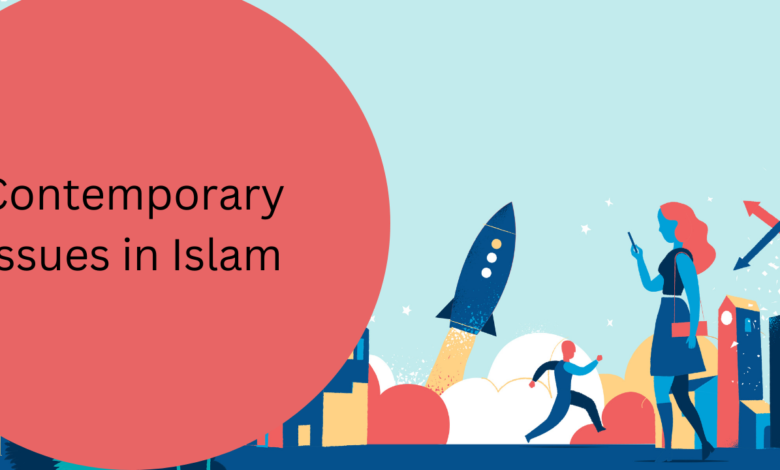Contemporary Issues in Islam
Navigating the Challenges: Contemporary Issues in Islam

Contemporary Issues in Islam
Contemporary issues in Islam refer to the current challenges, debates, and dilemmas faced by Muslims and Islamic communities around the world. These issues can be theological, social, political, or cultural in nature.

Introduction
Islam, as one of the world’s major religions, plays a crucial role in shaping the lives and perspectives of over 1.8 billion Muslims worldwide. Like any other religion, Islam faces a range of contemporary issues that challenge its followers and leaders in adapting to an ever-changing global landscape. These issues encompass a wide spectrum, from theological debates to socio-political challenges. In this article, we will explore some of the most pressing contemporary issues in Islam and how Muslims are navigating them.
Interpretation and Modernity
One of the central issues facing Islam today is the interpretation of Islamic teachings in the context of modernity. Traditional interpretations of the Quran and Hadith often clash with contemporary values and lifestyles. The challenge lies in reconciling these ancient texts with the demands of a rapidly evolving world. Many Muslims are engaged in ongoing efforts to reinterpret and adapt Islamic teachings to address issues like gender equality, human rights, and scientific advancements.
Also check.
- What is Interest in Islam?
- Who is the Holy Spirit in Islam?
- Who Wrote the Quran?
- Why Taking Bribe is Haram in Islam?
- What Time is the Muslim Prayer?
Extremism and Terrorism
The rise of extremism and terrorism in the name of Islam has garnered significant global attention. Groups like ISIS and Al-Qaeda have used Islam as a guise for their violent agendas, which has led to widespread misconceptions and Islamophobia. Muslims worldwide are actively involved in countering these extremist ideologies, emphasizing the peaceful and tolerant aspects of Islam. This issue is not only a theological challenge but also a critical socio-political concern for Muslims.
Women’s Rights
Women’s rights within Islam have been a topic of debate for centuries, and contemporary discussions continue to revolve around issues like gender equality, access to education, and the right to work. While Islamic feminism is on the rise, there are still parts of the Muslim world where women face significant challenges in achieving equal rights and opportunities. Progressive Muslim scholars and activists are advocating for reforms within Islamic jurisprudence to address these concerns.
Islamophobia
Islamophobia, or the fear and prejudice against Islam and Muslims, is a pressing issue in many parts of the world. Hate crimes, discrimination, and negative stereotypes persist. Muslim communities are actively working to combat Islamophobia through education, interfaith dialogue, and advocacy for their rights. Building bridges of understanding and dispelling misconceptions about Islam are ongoing efforts.
Political Instability
Muslim-majority countries have experienced political instability and conflict for decades. Issues like authoritarian regimes, sectarianism, and foreign intervention have led to widespread instability in regions like the Middle East and North Africa. Muslims in these regions and around the world are seeking ways to promote peace, democracy, and stability, often advocating for justice and human rights.
Technology and Social Media
The advent of technology and social media has presented new challenges and opportunities for Muslims. On one hand, these platforms provide a means for global communication and the spread of Islamic knowledge. On the other hand, they can be a source of division, misinformation, and extremism. Muslims are grappling with how to harness the positive aspects of technology while minimizing its negative impact on religious and social cohesion.
Conclusion
Contemporary issues in Islam are complex and multifaceted, reflecting the diverse and dynamic nature of the Muslim world. Muslims are actively engaged in addressing these challenges through a combination of theological reinterpretation, social activism, and dialogue. It is crucial to recognize that the majority of Muslims around the world are peaceful individuals who seek to live harmoniously in an ever-changing global society.
As we move forward, fostering understanding, promoting dialogue, and working towards solutions that address the contemporary issues in Islam will be essential for building a more inclusive and peaceful world for all.

FAQs
What are contemporary issues in Islam?
Contemporary issues in Islam refer to the current challenges, debates, and dilemmas faced by Muslims and Islamic communities around the world. These issues can be theological, social, political, or cultural in nature.
How is Islam adapting to modernity?
Islam is adapting to modernity through a process of reinterpretation, where scholars and Muslims are reexamining traditional teachings in light of contemporary values and advancements. This adaptation aims to reconcile Islamic principles with the demands of the modern world.
What is the role of women’s rights in contemporary Islam?
Women’s rights in Islam is a prominent contemporary issue. Many Muslims are advocating for gender equality, access to education, and employment opportunities for women within an Islamic framework. This issue involves ongoing discussions and debates.
How are Muslims countering extremism and terrorism?
Muslims are actively engaged in countering extremism and terrorism by promoting the peaceful and tolerant aspects of Islam. Efforts include religious education, community outreach, and cooperation with law enforcement agencies to prevent radicalization.
What is the impact of Islamophobia on Muslim communities?
Islamophobia has negative consequences on Muslim communities, leading to discrimination, hate crimes, and social exclusion. Muslims are working to combat Islamophobia through education, interfaith dialogue, and advocacy for their rights.
How do technology and social media affect Islam today?
Technology and social media have both positive and negative effects on Islam. They enable the global spread of Islamic knowledge but can also be a source of misinformation and extremism. Muslims are grappling with how to harness technology for positive purposes.
How can non-Muslims contribute to addressing contemporary issues in Islam?
Non-Muslims can contribute by educating themselves about Islam, fostering interfaith dialogue, and supporting initiatives that promote tolerance and understanding. Building bridges of cooperation and empathy is key to addressing contemporary challenges.
Are all Muslims affected by these contemporary issues?
While contemporary issues in Islam are widespread, their impact can vary from one region to another and among different Muslim communities. Not all Muslims face the same challenges, but many are actively engaged in addressing them.
What are some resources for learning more about contemporary issues in Islam?
Resources for learning more about these issues include books, academic articles, reputable news sources, and community organizations that focus on promoting understanding and dialogue.




